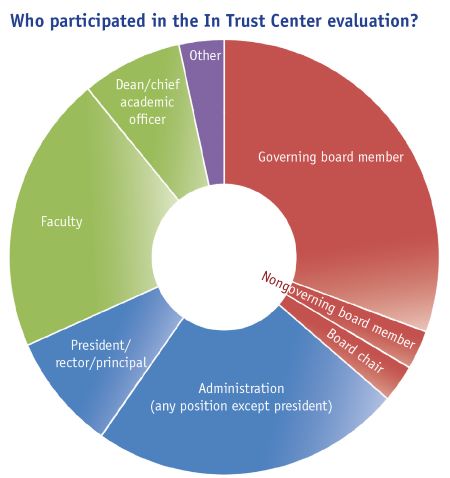Thank you! In April 2019, the In Trust Center partnered with the Social Research Lab at the University of Northern Colorado to launch a comprehensive programmatic evaluation. Our goal was to understand how well we are serving our members and affiliates, and how we can improve.
We have thoroughly combed through 120 pages of data and written-in comments. The responses and comments will help inform the work of the In Trust Center over the next few years.
Here’s an overview of who participated, what we heard and learned, and what’s next.
Who participated
More than 900 people took part in the evaluation — about 10 percent more than the number that participated in our last comprehensive evaluation, which took place in 2014.
 Participants in the evaluation hailed from a variety of different kinds of institutions, but two-thirds were at freestanding graduate-level theological schools. Another quarter were from divinity schools embedded in larger colleges or universities, and the remainder came from churches, denominations, nonprofit organizations, undergraduate colleges, or other organizations.
Participants in the evaluation hailed from a variety of different kinds of institutions, but two-thirds were at freestanding graduate-level theological schools. Another quarter were from divinity schools embedded in larger colleges or universities, and the remainder came from churches, denominations, nonprofit organizations, undergraduate colleges, or other organizations.
What they said
More than 80 percent of respondents read In Trust magazine, at least in part, and 93 percent of those readers find the magazine valuable in their work at their institutions. Almost 80 percent of readers read the printed version, and 60 percent of readers say that the magazine should continue to be produced in printed (and not just online) format. Three-quarters of readers say that their awareness of big-picture issues that face all institutions has improved because of reading In Trust.
About 85 percent of respondents say that they’re aware of In Trust Center webinars, and 31 percent of respondents have viewed a webinar.
Just over one-half of the respondents said they have heard of the In Trust Center’s helpline/resourcing service (which is called Resource Consulting and is available to anyone affiliated with an In Trust member school or affiliate organization). More than one-third of respondents said they have used Resource Consulting (although they may not have known that it was called by that name), and more than 90 percent of those said when they contacted the In Trust Center, they received the help they needed, by being connected to various resources.
What’s next
The leadership of the In Trust Center has already started to make changes in response to the evaluation. As of July 2019, webinars are free for board members, faculty, and all employees of our members and affiliates.
We’re planning special editions of In Trust magazine that are dedicated to critical topics so that all schools (freestanding, embedded, consortium members) and all leaders (whether in the board, the administration, or the faculty) in all regions (the United States and Canada alike) can find value in the magazine’s pages.
We’ve expanded our resource database and we’re enhancing the ways that we can connect all our constituents with peers, experts, practical guides, wise practices, and critical takeaways.
To learn more about what we heard, or to offer further suggestions or explain your own unique challenges, contact the In Trust Center at 302-654-7770 or resources@intrust.org. We’d love to hear from you.
You told us what articles you want
Μore on educational models/academic programs
Μore on strategic planning
Μore on board governance
Μore on institutional finances
Μore on institutional culture
You told us what webinars you want
Μore on board development and recruitment
Μore on student enrollment, recruitment, and retention
Μore on faculty development and engagement
Μore on fundraising and advancement
Μore on financial stability
Praise and suggestions for improvement
- In Trust is a “trustworthy source” for seminary news that “helps me be in the know,” “sparks new ideas and also affirms what we may be doing right.”
- In Trust is a “conversation starter” for boards and “raises questions that might be overlooked”; it is the “the go-to authority for many of the emerging issues in graduate theological education.”
- “Sometimes the information is too specific, sometimes it is too general to be of use.”
- “Not all articles relate to my interest”; “not all articles apply to our institution”; “not vital but handy.”
You told us how to improve
Μore issues relevant to individuals’ jobs & roles
Μore focus on faculty
Μore coverage of embedded schools
Μore on Canadian schools
Μore in-depth articles
Μore practical how-to articles
You told us what you like
- Changing Scenes, news, and trends
- Reading what other schools are doing
- Sharing of “common wisdom”
You told us to go deeper
Μore on competency-based learning
Μore on financial stability
Μore on alternatives models of theological education
Μore on marginalized identities
Μore on the future of theological education
Survey reveals the impact of the In Trust Center




Significance: Two-thirds of respondents read no other publications that address trends and issues in theological education.
“As a relative newcomer to the world of graduate theological education, I find the magazine an invaluable resource for helping me to understand issues that concern boards, staff, and faculty as well as ‘industry’ trends.” — Evaluation participant